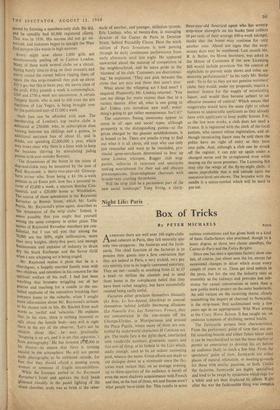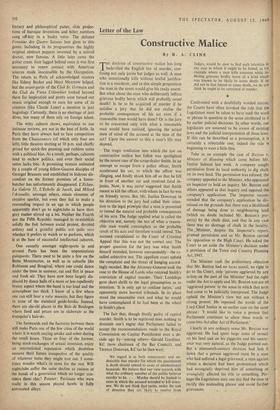Night Life: Paris
Box of Tricks
By PETER MICHAELS
PARIS
ALTHOUGH there are well over 100 night-clubs and cabarets in Paris, they fall naturally into only two categories: the factories and the farm- yards. The chief function of the factories is to process their guests into a firm conviction that they are indeed in Paris, a very wicked, very gay city entirely true to its hugely canvassed notoriety. They set out—usually at anything from £1 to £5 a head--to titillate the clientele and to send them home in the complacent belief that they have been rather naughty, but have successfully resisted being really sinful.
Factories either proclaim themselves blatantly (Le Sexy, Le Sex-Appeal, Shocking) or conceal themselves behind artfully 'becoming allusions (La Nouvelle Eve, Les Naturistes, Venus); they are concentrated in the side-streets off the Champs-Elysdes, in Montparnasse and around the Place Pigalle, where many of them are con- trolled by underworld chafacters 6f Corsican ori- gin. The staple fare is the girlie show, interlarded with vaudeville numbers, gymnastic capers and that sort of thing: at its lushest in the Lido which, oddly enough. used to be an indoor swimming pool, whence the name. Great efforts are made to cut dialogue down to a minimum since the fac- tories must reckon that, on an average evening, up to three-quarters of the audience is bereft of even the most shadowy acquaintance with French and that, at the best of times, wit and finesse aren't what people have come for. This results in some curious contortions and has given birth to a kind of basic Gallo-Saxon also practised, though to a lesser degree, at those two classic standbys, the Casino de Paris and the Polies Berg?re.
Once one has seen a specimen factory show one has, of course, just about seen the lot, except for occasional changes in decor which occur every couple of years or so. These get tired notices in the press, but for the rest the industry runs as smoothly as the railways and provides less sub- stance for casual conversation in town than a new puhlic works project on the outer boulevards. An odd variant on the recurring theme, closely resembling the import of charcoal to Newcastle, is the strip-tease, first acclimatised only a few years ago in an appropriately Wild West setting at the Crazy Horse Saloon. It has caught on; an ominous symptom of declining mental health.
The farmyards possess twin characteristics. From the performers' point of view they are use- ful sounding-boards and either fatten talent until it can be merchandised to suit the mass market or permit an entertainer to develop his art before an audience likely to catch a fine hint. From the spectators' point of view, farmyards are either places of natural relaxation, or meeting-grounds for those with similar passions, or both. Unlike the factories, farmyards are highly specialised and tend to be swept by epidemics which rage for a while and are then displaced by others. Right after the war the fashionable thing was complex, literary and philosophical patter, slide projec- tions of baroque inventions and bitter numbers sung off-key in a husky voice. The defunct Fontaine des Quatre Saisons lent gloss to this genre, including in its programmes the highly original abstract puppets invented by a retired doctor, now famous. A little later came the guitar craze. Jazz lagged behind since it was first necessary to renew contact with American sources made inaccessible by the Occupation. The return to Paris of acknowledged masters like Sidney Bechet and Mezz Mezzrow helped, but the avant-garde of the Club St. Germain and the Club du Vieux Colombier looked beyond them for inspiration and pretty soon turned out music original enough to earn for some of its creators (like Claude Luter) a mention in jazz hagiology. Currently, there is no shortage of jazz dives, but many of them rely on foreign talent.
The witty cabaret shows, equivalent to our intimate reviews, are not in the best of fettle. In Paris they have always had to face competition from the Chansonniers (of which only four are left), little theatres starting at 10 p.m. and chiefly prized for quick-fire punning and ruthless satire with a political bias. As a result, perhaps, cabarets tend to eschew politics, and even their social satire lacks bite. A promising venture animated by a couple of young fellow-Gascon disciples of Georgei Brassens and established in hideous dis- comfort on the former premises of a horse- butcher has unfortunately disappeared. L'Ecluse, La Galerie 55, L'Echelle de Jacob, and Milord l'Arsouille, amongst others, retain elements of creative sparkle, but even they fail to make a resounding impact in an age in which people apparently don't go to nightclubs to have their grey matter stirred up a bit. Neither the Fourth nor the Fifth Republic managed to re-establish solidly the link between social protest, devoted artistry and a grateful public not quite sure whether it prefers to watch or to perform, which is at the base of successful intellectual cabarets.
One casualty amongst night-sports in and around Paris has been the unpretentious guinguette. There used to be quite a few on the Butte Montmartre, as well as in suburbs like Robinson and Bougival, where one could dance under the trees in summer, eat and flirt in peace and fresh air. They have now been largely dis- placed by dance halls of a more or less repellently brassy aspect where the band is too loud and the atmosphere too thick. I know of a few where one can still hear a valse musette, but they figure in none of the standard guide-books. Instead, there are chi-chi places in the Bois de Boulogne where food and prices are as elaborate as the trumpeter's hair-do.
The farmyards and the factories between them still make Paris one of the few cities of the world where it is worth staying awake and sober during the small hours. Three or four of the former, being stock-exchanges of sexual inversion, enjoy an international reputation which doubtless ensures their future irrespective of the quality of whatever turns they might trot out. I some- times wonder what's in store for the rest. Will nightclubs suffer the same decline as casinos at the hands of a generation which no longer con- siders them chic? Pointer: Parisians who were really in this season played bowls in fully automated alleys.



































 Previous page
Previous page